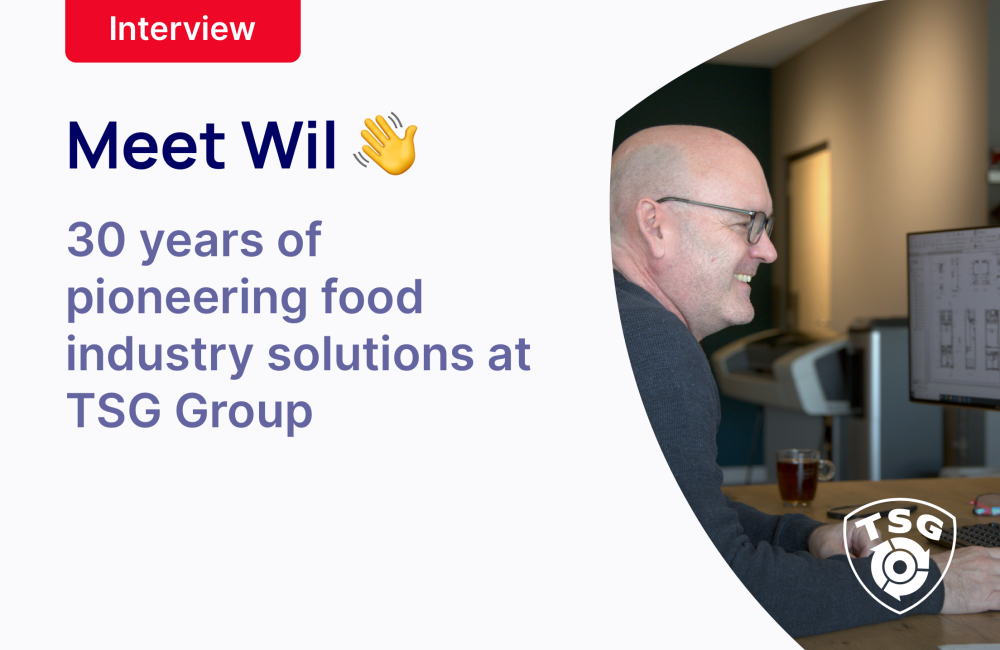
30 years of expertise in the food market at TSG Group
Our colleague Wil has been with TSG Group for nearly 30 years and has extensive experience in this sector. In this interview, Wil shares his insights and experiences, with a special focus on the food industry.
From drawing board to 3D CAD
Wil started his career at TSG Group at a time when the transition was being made from drawing on the drawing board to 2D CAD drawing. "I came from an engineering firm where everything was still drawn with ink pens on tracing paper," Wil explains. "It was a huge transition when 2D drawing with software like CAD came up, but it greatly expanded our capabilities at the time."
With today's 3D CAD software, we can now quickly and accurately create complex designs and test virtual prototypes. This reduces errors and inefficiencies, shortens design time, and promotes innovation, allowing us to provide better-customized solutions for customers.
Three decades of innovation in the food market
During his nearly 30-year career at TSG Group, Wil has primarily focused on the food industry. His extensive knowledge and experience in this sector make him an indispensable link within the company. "I have had the opportunity to work on many great projects, such as industrial cooking and frying ovens," says Wil. "These projects are often long-term development trajectories that require a lot of precision and knowledge."
The complexity of machine construction in the food industry
Building machines for the food industry presents specific challenges. "One of the main aspects is the choice of materials," Wil explains. "Not all plastics and metals are suitable for use in food production. Materials must be non-toxic and not release harmful substances." Teflon, for example, is often used as a guide because of its excellent glide and non-stick properties and chemical resistance. Suppliers must demonstrate through a DOC (Declaration of Conformity) and an accompanying test report that their material or product is food safe.
In the food industry, the choice of plastics is important, examples of commonly used plastics are polyethylene (PE), polyoxymethylene (POM), and polyetheretherketone (PEEK). These materials are chosen because of their high resistance to chemicals, wear, and high temperatures, and because they meet the strict food safety standards. As for metals, stainless steel (RVS 304/316) and aluminum (EN AW...) are the preferred materials because of their durability and ease of cleaning.
Hygiene and cleanability: Priorities in machine design
Hygiene is a crucial element in the design of machines for the food industry. "The machine must be designed in such a way that it is easy to clean," says Wil. "There should be no places where bacteria can accumulate." This means that everything must be visually inspectable, and the entire machine must be accessible for thorough cleaning.
An example of this is placing pipework on a slope so that everything drains well and no water residues remain after cleaning. To keep cleaning as accessible as possible, there should preferably be as few 90-degree angles as possible, and pipework must always be visually inspectable for contaminants so that no bacterial growth can occur.
Traceability and documentation
Another important aspect is the traceability of the materials used. "All materials used in the machine must be traceable through batch numbers and documented," Wil explains. "If a problem occurs, such as a break in the material, it must be possible to trace the used raw material through the batch numbers." This documentation makes it possible to quickly identify whether a production or material fault caused issues, allowing swift action to prevent further problems.
Moreover, this precise documentation helps not only in solving problems but also in complying with various laws and regulations.
International guidelines and certifications
The food industry is highly regulated, and the rules can vary significantly by country. "In China, for example, the guidelines are simpler than in Canada," Wil explains. "In Canada, the guidelines (Standards Council of Canada SCC) can vary by province, making compliance more complex." At TSG Group, we ensure that we stay informed about the latest international guidelines and certifications, such as the EU Directive 1935/2004/EC for materials that come into contact with food and the US FDA regulations.
TSG Group as an expert in the food industry
Wil's experience and expertise in the food industry make him a valuable asset within TSG Group. His contributions to complex and long-term projects, his insight into material selection and hygienic design, and his knowledge of international regulations enable us to build machines that not only meet the highest standards of safety and efficiency but also the specific needs of our customers in the food industry.
